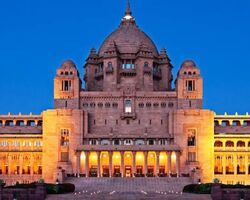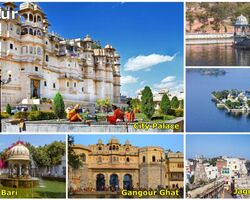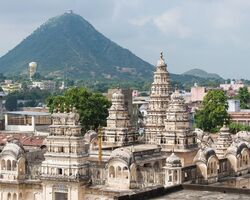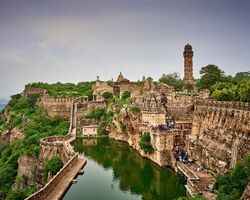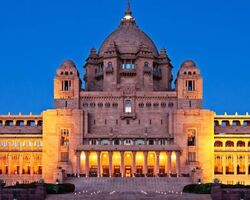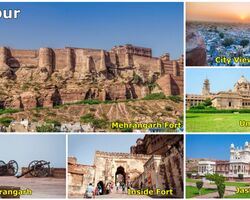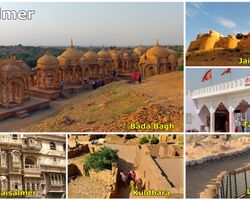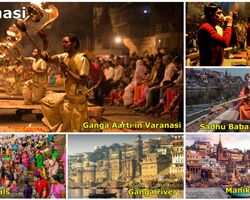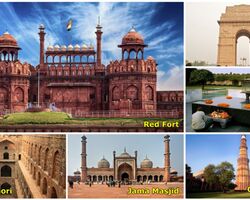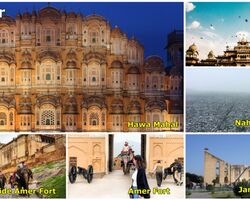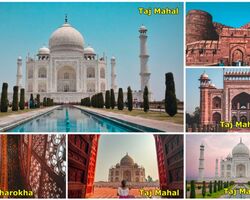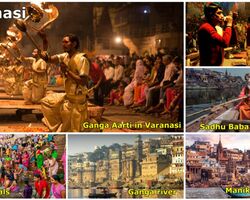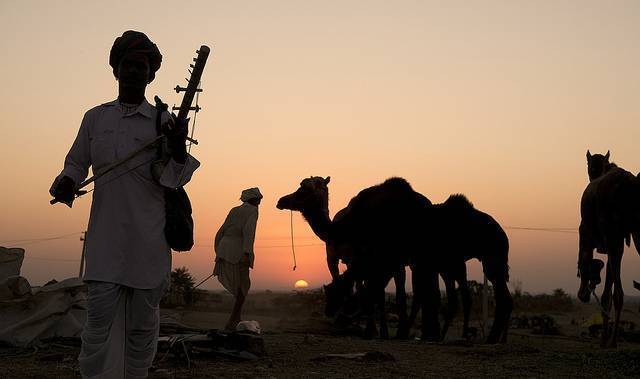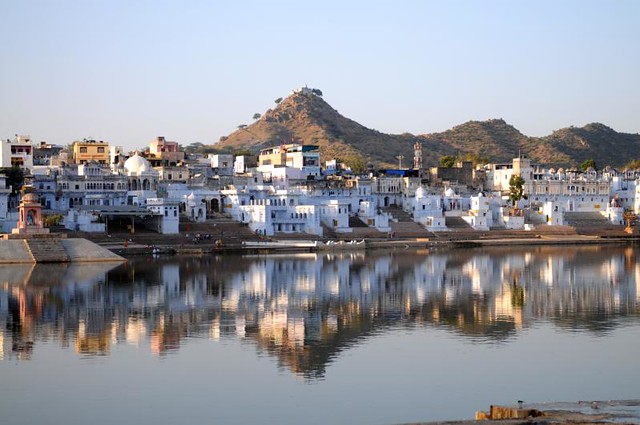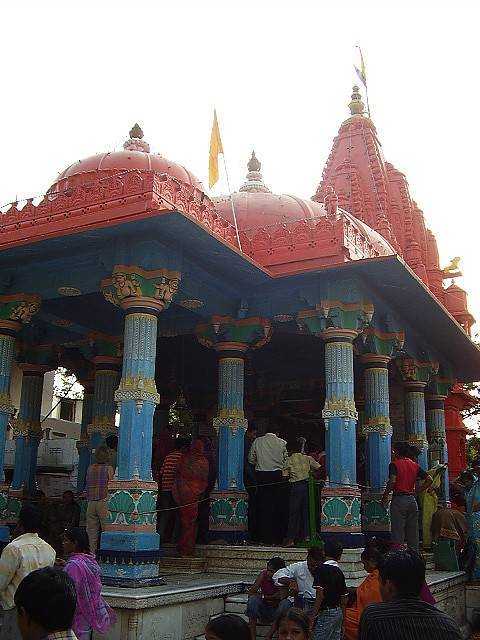Pushkar , Rajasthan
About Pushkar
Pushkar is one of the oldest cities of India and known as city of temples. This small yet captivating town is a blend of sacred traditions, vibrant markets, and serene landscapes, offering visitors a unique glimpse into the soul of India. Nestled in the heart of Rajasthan, Pushkar stands as a jewel of spiritual significance and cultural richness.
Pushkar a city steeped in so much legend and holiness you could almost fly a magic carpet across Arabia to get here. But if your carpet won’t take off, you won’t be stuck. Ajmer is about half an hour away and you can make the trip by bus or taxi. Local buses leave regularly from the main bus station in Ajmer. Pushkar features heavily in Hindu legend, and the town was a residence for many rulers during the Mughal Empire.
Temple viewing is an important activity in Pushkar. Many tourists come from all over the world and thousands of pilgrims visit Pushkar each year. Watching the life on the lake by the ghats is activity enough for some, and many of India’s festivals, from Diwali to the Holi Festival, take place here in full color.
Pushkar is a good place to buy beads, bangles, leather goods and textiles. Try the Sadar Bazaar for bargains. Try the Funky Monkey Café for a good place to relax and read. There are many foods in Pushkar, Daal Batti is a delicious dish containing Rajma beans. There are many opportunities to try yoga, massage or meditation while in Pushkar. Always look for a quality instructor; try following the recommendations of other travelers. You will see many holy men, or Sadhus, in Pushkar.
Near Pushkar is the Pushkar Yoga Garden, so tired travelers can get bendy, flexible, and hopefully rejuvenated. Not to be missed is the speactacular Pushkar Camel Fair. Hundreds of camels spread out across the sandy desert.
Men may approach you in Pushkar and invite you to take part in a puja. They may be looking to charge you for this service. As with anywhere in India, try to distinguish between those looking to make money and those being genuinely friendly. It pays to be alert in Pushkar. Be aware of pickpockets and do not accept food or even cigarettes from strangers as it may be drugged. It is also important to respect the sanctity of the town. Footwear should be removed thirty feet away from the ghats of the lake. By no means take alcohol to Pushkar as it is forbidden here.
What is Pushkar?
Pushkar is a sacred pilgrimage town situated on the edge of the Thar Desert in Rajasthan, India. It's renowned for its holy lake, believed to have been created by Lord Brahma, and for hosting one of the world's largest camel fairs. The town is a tapestry of temples, ghats, and winding streets, exuding an atmosphere of tranquility and spiritual devotion.
Location and Significance
Located in the Ajmer district of Rajasthan, about 15 kilometers northwest of Ajmer and 145 kilometers southwest of Jaipur, Pushkar is easily accessible yet maintains an otherworldly charm. Its significance lies in its status as one of the five sacred dhams (pilgrimage sites) for devout Hindus. The town is also famous for housing one of the few Brahma temples in the world, making it a unique destination for both spiritual seekers and curious travelers.
Brief History About Pushkar
Pushkar's history is steeped in myth and legend. According to Hindu mythology, the town was created when Lord Brahma dropped a lotus flower on the earth, and Pushkar Lake sprang up at that spot. The earliest historical mentions of Pushkar date back to the 4th century BCE, but it has likely been a site of spiritual importance for even longer.
Over the centuries, Pushkar has been a witness to various dynasties and empires, including the Mauryas, Guptas, Chauhans, and Mughals. Each left their mark on the town's architecture and culture. The annual Pushkar Camel Fair, which began as a small gathering of local traders, has grown into a world-famous event, drawing thousands of visitors each year.
Today, Pushkar stands as a testament to India's rich spiritual heritage, offering a unique blend of the ancient and the modern. Whether you're drawn by its sacred aura, fascinated by its cultural tapestry, or simply seeking a peaceful retreat, Pushkar promises an experience that touches the soul and awakens the senses.
As we delve deeper into this comprehensive guide, we'll explore every facet of Pushkar - from its geographical features and cultural insights to practical travel tips and hidden gems. Whether you're a pilgrim, a culture enthusiast, or an adventurous traveler, this guide will help you make the most of your Pushkar experience.
Geographical Information
Location Details
Pushkar is located in the Ajmer district of Rajasthan, India. It lies at the edge of the Thar Desert, nestled between the Aravalli Hills. The town is situated around Pushkar Lake, which is at an elevation of about 510 meters (1,670 feet) above sea level. Its geographical coordinates are 26.4895° N, 74.5503° E.
Key distances:
- 15 km northwest of Ajmer
- 145 km southwest of Jaipur (the state capital)
- 390 km southwest of New Delhi
Climate and Weather Patterns
Pushkar experiences a semi-arid climate, characterized by hot summers, mild winters, and limited rainfall. The weather can be divided into three main seasons:
- Summer (April to June): Hot and dry with temperatures ranging from 25°C to 45°C (77°F to 113°F).
- Monsoon (July to September): Moderate rainfall with temperatures between 24°C to 35°C (75°F to 95°F).
- Winter (October to March): Cool and pleasant with temperatures ranging from 8°C to 22°C (46°F to 72°F).
Best Times to Visit
The ideal time to visit Pushkar is from October to March when the weather is most pleasant. This period offers clear skies, moderate temperatures, and comfortable conditions for exploring the town and its surroundings.
Specific periods of interest:
- Pushkar Camel Fair (usually in November): This world-famous event draws thousands of visitors. While it's an exciting time to visit, expect large crowds and higher prices.
- Winter months (December to February): Perfect for outdoor activities and sightseeing, with cool, crisp weather.
- Spring (March): Comfortable temperatures and the possibility of witnessing the colorful Holi festival.
Summer months (April to June) are extremely hot and best avoided unless you're accustomed to high temperatures. The monsoon season (July to September) can be pleasant with reduced heat, but some activities may be limited due to rain.
Cultural Insights
1. Local Customs and Traditions
Pushkar is steeped in Hindu traditions and customs:
- Sacred Bath: Taking a dip in Pushkar Lake is considered highly auspicious.
- Aarti Ceremony: Evening prayers at the ghats are a daily ritual.
- Vegetarianism: The town is strictly vegetarian, and alcohol is prohibited within city limits.
- Modest Dress: Visitors are expected to dress modestly, especially near religious sites.
- No Leather: Due to religious beliefs, leather items are discouraged in the town.
2. Rajasthani Cuisine
While Pushkar is entirely vegetarian, it offers a variety of delicious local and Rajasthani dishes:
- Dal Baati Churma: A traditional Rajasthani dish
- Malpua: Sweet pancakes
- Pushkar Chai: Spiced tea often served with saffron
- Kachori: Spicy snack filled with lentils or vegetables
- Rabri: A sweet, condensed-milk dessert
Many restaurants offer cooking classes for those interested in learning about local cuisine.
3. Festivals and Events
Pushkar hosts several vibrant festivals throughout the year:
- Pushkar Camel Fair (November): The town's most famous event, featuring camel trading, cultural performances, and various competitions.
- Pushkar Music Festival (March): Celebrates classical and folk music.
- Holi (February/March): The festival of colors is celebrated with great enthusiasm.
- Kartik Purnima (October/November): A significant religious festival coinciding with the full moon.
- Brahma Jayanti (January/February): Celebrates the birth of Lord Brahma.
4. Languages Spoken
The primary languages spoken in Pushkar are:
- Hindi: The most widely spoken language
- Rajasthani: The local dialect, with variations like Marwari
- English: Commonly understood in tourist areas and hotels
While knowing Hindi can enhance your experience, English is widely spoken in tourist establishments, making communication relatively easy for international visitors.
Must-Visit Attractions
1) Pushkar Lake
The heart of the town, Pushkar Lake is surrounded by 52 bathing ghats. It's considered one of the most sacred lakes in India, believed to have been created by Lord Brahma.
Rituals and Activities
- Holy Dip: Devotees believe that taking a dip in the sacred waters of Pushkar Lake during Kartik Purnima can wash away sins and grant salvation.
- Ghats: The lake is surrounded by 52 ghats, where pilgrims perform rituals and offer prayers. Some of the most prominent ghats include Varah Ghat, Gau Ghat, and Brahma Ghat.
- Evening Aarti: The evening aarti at the ghats is a mesmerizing experience, where the sound of bells and chants fills the air, creating a divine atmosphere.
Key points:
- Boat rides available for scenic views
2) Brahma Temple
One of the few temples in the world dedicated to Lord Brahma, this 14th-century temple is a must-visit site.
Architectural Highlights
- Marble Steps and Silver Coins: The temple features a silver turtle, marble steps, and hundreds of silver coins donated by devotees.
- Sanctum Sanctorum: The innermost part of the temple houses the idol of Lord Brahma, alongside his consort, Gayatri.
- Red Spire: The temple’s red spire stands out against the blue sky and can be seen from various points in the town.
Key points:
- Remember to dress modestly and remove shoes before entering
3) Savitri Temple
Perched atop the Ratnagiri Hill, this temple offers panoramic views of Pushkar.
Key points:
- Dedicated to Savitri, Lord Brahma's first wife
- Accessible via a challenging climb or cable car ride
- Best visited during sunrise or sunset for breathtaking views
4) Pushkar Bazaar
The vibrant market streets of Pushkar offer a colorful shopping experience.
Key points:
- Traditional Rajasthani textiles, jewelry, and handicrafts
- Famous for its leather goods, although be mindful of restrictions in religious areas
- Opportunity to practice bargaining skills
Activities and Experiences
Pushkar Camel Fair
The Pushkar Camel Fair, held annually in November, is one of the largest livestock fairs in the world. It’s a vibrant event where tradition meets festivity, attracting visitors from across the globe.
Key Highlights
- Camel Trading: The fair is a major event for camel trading, where herders bring their finest camels to trade and showcase.
- Cultural Events: The fair features a variety of cultural events, including folk music, dance performances, camel races, and competitions like the “Matka Phod” (pot breaking).
- Handicrafts and Souvenirs: The fair is also a great place to shop for traditional Rajasthani handicrafts, jewelery, and textiles.
Desert Safari
Explore the Thar Desert with a thrilling desert safari. The safari can be done on a camel or in a jeep, offering a chance to witness the vast desert landscape and experience the rural lifestyle of Rajasthan.
Safari Options
- Camel Safari: A traditional way to explore the desert, camel safaris take you through sand dunes, small villages, and provide a glimpse into the life of the local people.
- Jeep Safari: For those looking for a faster and more comfortable way to explore, jeep safaris are a great option. They cover more ground and allow you to experience the rugged beauty of the desert.
Key points:
- Options range from short rides to overnight desert camping experiences
- Best enjoyed during cooler months (October to March)
- Sunset safaris are particularly popular
- Options range from short rides to overnight desert camping experiences
- Best enjoyed during cooler months (October to March)
- Sunset safaris are particularly popular
Spiritual Practices
Pushkar offers numerous opportunities for spiritual enrichment:
- Meditation sessions: Many ashrams and retreat centers offer guided meditation.
- Yoga classes: Join morning or evening yoga sessions by the lake or in local studios.
- Temple visits: Explore the numerous temples beyond the famous Brahma Temple.
- Participate in pujas: Many ghats offer the chance to participate in traditional Hindu rituals.
Hot Air Balloon Rides
For a breathtaking view of Pushkar and the surrounding desert:
- Available during cooler months (October to March)
- Flights typically last 60 minutes
- Offers unique aerial views of the town, lake, and desert landscape
Shopping in Local Markets
Pushkar's bazaars are a shopper's paradise:
- Sarafa Bazaar: Known for silver jewelry and traditional Rajasthani accessories
- Main Market: Offers textiles, handicrafts, and souvenirs
- Kandari Bazaar: Famous for leather goods (remember restrictions near religious sites)
- Baza Bazaar: Great for musical instruments and camel decorations
Yoga and Meditation
Pushkar is a haven for yoga enthusiasts:
- Numerous yoga schools offering drop-in classes and teacher training courses
- Meditation retreats ranging from a few days to several weeks
- Ayurvedic treatments and wellness programs available at various centers
Popular Retreats
- Pushkar Yoga Garden: A peaceful retreat offering yoga classes, meditation sessions, and Ayurvedic treatments.
- Savitri Temple Meditation: Located on a hilltop, the Savitri Temple is an ideal spot for meditation, offering panoramic views of Pushkar and the surrounding landscape.
Local Cuisine and Dining
Pushkar offers a variety of dining options, from traditional Rajasthani cuisine to international dishes. The town’s food scene is a mix of street food stalls, cafes, and restaurants.
Must-Try Dishes
- Dal Baati Churma: A traditional Rajasthani dish made of lentils, baked wheat balls, and sweetened cereal, often served with ghee.
- Malpua: A popular sweet dish, especially during the Pushkar Camel Fair, Malpua is a deep-fried pancake soaked in sugar syrup.
- Poha: A light and healthy breakfast option made from flattened rice, often garnished with peanuts, curry leaves, and lemon.
Popular Restaurants and Cafes
- The Laughing Buddha Café: Known for its laid-back atmosphere and delicious vegetarian dishes, The Laughing Buddha Café is a favorite among travelers.
- Sunset Café: Located on the banks of Pushkar Lake, this café offers a variety of international dishes along with stunning sunset views.
- Honey & Spice: A popular health food café offering organic and vegetarian options, including fresh juices, salads, and sandwiches.
Travel Tips
Best Time to Visit
The best time to visit Pushkar is between October and March, when the weather is pleasant and the town is buzzing with festivals and events. The Pushkar Camel Fair in November is the peak tourist season, offering a unique experience.
Accommodation Options
Pushkar caters to various budgets and preferences:
- Luxury hotels:
- Ananta Spa and Resort
- Westin Pushkar Resort & Spa
- Mid-range options:
- Hotel Pushkar Palace
- Jagat Palace
- Budget accommodations:
- Zostel Pushkar
- Hotel Everest
- Unique stays:
- Desert camps
- Heritage havelis
Recommended Hotels
- Ananta Spa & Resorts: A luxury resort offering comfortable rooms, a spa, and an infinity pool with views of the Aravalli Hills.
- The Pushkar Bagh: A heritage property designed in traditional Rajasthani style, offering luxurious tents, a swimming pool, and cultural activities.
- Zostel Pushkar: A popular backpacker hostel offering affordable accommodations, a vibrant atmosphere, and opportunities to meet fellow travelers.
Getting Around & Transportation
Pushkar is a small town, and most attractions are within walking distance. However, for trips to nearby areas or the desert, you can hire auto-rickshaws, taxis, or rent a bike.
- Getting to Pushkar:
- Nearest airport: Kishangarh Airport (45 km)
- Nearest major railway station: Ajmer Junction (14 km)
- Regular buses from Jaipur and Ajmer
- Local transportation:
- Auto-rickshaws for short distances
- Rental bicycles for exploring the town
- Camel carts for a traditional experience
Packing Essentials
- Modest, lightweight clothing (shoulders and knees should be covered)
- Comfortable walking shoes
- Sun protection (hat, sunglasses, sunscreen)
- Reusable water bottle
- Small backpack for day trips
- Respectful attire for temple visits
Safety and Health Precautions
Respect Local Customs
Pushkar is a sacred town, and it’s important to respect local customs and traditions. Dress modestly, especially when visiting temples, and refrain from consuming alcohol or non-vegetarian food within the town limits.
General Safety Guidelines
- Be cautious of pickpockets in crowded areas, especially during festivals
- Avoid walking alone at night in isolated areas
- Respect local customs and dress codes
- Be wary of unauthorized guides or touts
Health Tips for Visitors
- Drink only bottled or properly filtered water
- Eat at hygienic establishments
- Use mosquito repellent, especially during evenings
- Protect yourself from the sun, particularly during summer months
Medical Facilities Nearby
- Pushkar Hospital: Basic medical care available
- Jawahar Lal Nehru Hospital, Ajmer (15 km away): Larger facility for more serious issues
- Several pharmacies available in the town center
Always carry travel insurance and any personal medications you might need.
Budget Planning
Accommodation Costs
- Luxury hotels: ₹7,000 - ₹20,000 per night
- Mid-range hotels: ₹2,000 - ₹6,000 per night
- Budget accommodations: ₹500 - ₹1,500 per night
Food and Drink Expenses
- Local restaurant meals: ₹100 - ₹300 per person
- Mid-range restaurant meals: ₹300 - ₹800 per person
- Chai (tea): ₹10 - ₹30
- Bottled water: ₹20 - ₹40
Activity and Tour Prices
- Camel safari: ₹500 - ₹2,000 (depending on duration)
- Hot air balloon ride: ₹8,000 - ₹12,000 per person
- Guided town tour: ₹500 - ₹1,500
- Yoga class: ₹300 - ₹800 per session
Transportation Costs
- Auto-rickshaw within town: ₹30 - ₹100 per ride
- Taxi from Ajmer to Pushkar: ₹500 - ₹800
- Bicycle rental: ₹100 - ₹200 per day
Money-Saving Tips
- Visit during off-season for better accommodation rates
- Eat at local dhabas for authentic and affordable meals
- Negotiate prices for souvenirs and activities
- Consider staying at hostels or guesthouses for budget accommodation
- Use public transportation or walk to explore the compact town center
This comprehensive guide should provide you with a solid understanding of what to expect when visiting Pushkar. Remember that prices and availability may vary depending on the season and current events. Pushkar offers a unique blend of spirituality, culture, and natural beauty, making it a memorable destination for travelers seeking an authentic Indian experience.
Location & Places to Visit on Pushkar Map
View destinations and attractions nearby Pushkar, on an interactive map.
Freedom to make your own trip!
What you want, when you want and how you want.



